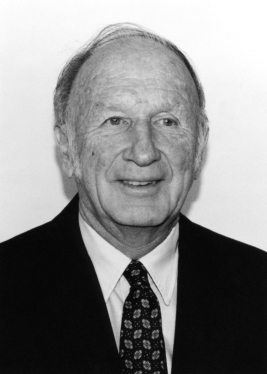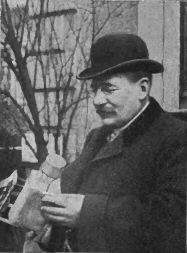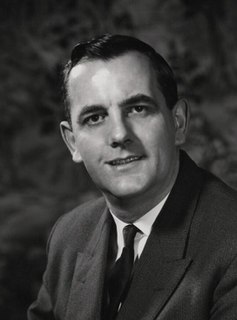
The World Meteorological Organization(WMO) is a specialized agency of the United Nations responsible for promoting international cooperation on atmospheric science, climatology, hydrology and geophysics.

Olav V was King of Norway from 1957 until his death in 1991.
The Leeuwenhoek Medal, established in 1877 by the Royal Netherlands Academy of Arts and Sciences (KNAW), in honor of the 17th- and 18th-century microscopist Antoni van Leeuwenhoek, is granted every ten years to the scientist judged to have made the most significant contribution to microbiology during the preceding decade. From 2015 the Royal Dutch Society for Microbiology (KNVM) will be awarding the Leeuwenhoek Medal.

The British Academy is the United Kingdom's national academy for the humanities and the social sciences. It was established in 1902 and received its royal charter in the same year. It is now a fellowship of more than 1,000 leading scholars spanning all disciplines across the humanities and social sciences and a funding body for research projects across the United Kingdom. The academy is a self-governing and independent registered charity, based at 10–11 Carlton House Terrace in London.

Christophorus Henricus Diedericus Buys Ballot was a Dutch chemist and meteorologist after whom Buys Ballot's law and the Buys Ballot table are named. He was first chairman of the International Meteorological Organization, the organization that would become the World Meteorological Organization.
The International Meteorological Organization was the first organization formed with the purpose of exchanging weather information among the countries of the world. It came into existence from the realization that weather systems move across country boundaries; and that knowledge of pressure, temperature, precipitations, etc. upstream and downstream is needed for weather forecasting. It was superseded by the World Meteorological Organization.
The year 1991 in architecture involved some significant architectural events and new buildings.

The Royal Meteorological Society is a long-established institution that promotes academic and public engagement in weather and climate science. Fellows of the Society must possess relevant qualifications, but Associate Fellows can be lay enthusiasts. Its Quarterly Journal is one of the world's leading sources of original research in the atmospheric sciences.

Sir John Theodore Houghton was a Welsh atmospheric physicist who was the co-chair of the Intergovernmental Panel on Climate Change's (IPCC) scientific assessment working group which shared the Nobel Peace Prize in 2007 with Al Gore. He was the lead editor of first three IPCC reports. He was professor in atmospheric physics at the University of Oxford, former Director General at the Met Office and founder of the Hadley Centre.

Jacob Aall Bonnevie Bjerknes was a meteorologist. He is known for his key paper in which he pointed the dynamics of the polar front, mechanism for north-south heat transport and for which he was also awarded with a doctorate degree from University of Oslo.

Edward Norton Lorenz was an American mathematician and meteorologist who established the theoretical basis of weather and climate predictability, as well as the basis for computer-aided atmospheric physics and meteorology. He is best known as the founder of modern chaos theory, a branch of mathematics focusing on the behavior of dynamical systems that are highly sensitive to initial conditions.

Erik Herbert Palmén was Finnish meteorologist, born in Vaasa. He worked at the University of Chicago in the Chicago school of meteorology on cyclones and weather fronts with Vilhelm Bjerknes. He contributed to the explanation of the dynamics of the jet stream and the analysis of data collected by radiosondes; his preprocessed and quality checked datasets were widely used by other researchers. Palmen was a multisided researcher who published articles in meteorology, geophysics and oceanography. The 1969 book by Palmen and Chester W. Newton, "Atmospheric Circulation Systems: Their Structure and Interpretation", is still used as lecture material in the universities around the world.
Olgierd Cecil Zienkiewicz was a British academic of Polish descent, mathematician, and civil engineer. He was born in Caterham, England. He was one of the early pioneers of the finite element method. Since his first paper in 1947 dealing with numerical approximation to the stress analysis of dams, he published nearly 600 papers and wrote or edited more than 25 books.

Knut Magne Haugland, DSO, MM, was a resistance fighter and noted explorer from Norway, who accompanied Thor Heyerdahl on his famous 1947 Kon-Tiki expedition.

Hugo Emil Hergesell was a German meteorologist.

Sir Basil John Mason was an expert on cloud physics and former Director-General of the Meteorological Office from 1965 to 1983 and Chancellor of the University of Manchester Institute of Science and Technology (UMIST) from 1994 to 1996.
Aksel C. Wiin-Nielsen was a Danish professor of meteorology at University of Copenhagen, University of Michigan, Director of the European Centre for Medium-Range Weather Forecasts (ECMWF), and Secretary-General of the World Meteorological Organization (WMO).
A music award is an award or prize given for skill or distinction in music. There are different awards in different countries, and different awards may focus on or exclude certain music. For example, some music awards are only for classical music and include no popular music. Some music awards are academic, some are commercial and created by the music industry.











